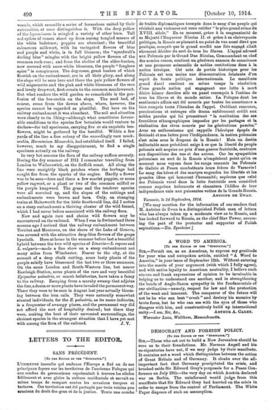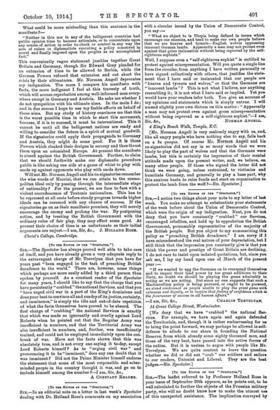DEMOCRACY AND FOREIGN POLICY.
[To THE EDITOR OF TER SPECTATOR."] SIR,—Those who set out to build a New Jerusalem should be sure as to their foundations. Mr. Norman Angell and his co-signatories have not, if we may judge by their manifesto. It contains not a word which distinguishes between the action of Great Britain and of Germany. It cloaks over the all- important fact that Germany precipitated the crisis, and brushed aside Sir Edward Grey's proposals for a Peace Con- ference on July 28th—the very day on which Austria declared war on Serbia. The uninformed would judge from this manifesto that Sir Edward Grey had hurried on the crisis in order to escape from the control of Parliament. The White Paper disposes of such an assumption.
What could be more misleading than this sentence in the
manifesto?—
"Neither in this nor in any of the belligerent countries had public opinion time to become articulate, or to concentrate upon any course of action in order to check or control in any way the acts of rulers or diplomatists executing a policy conceived in Secret and finally imposed upon the peoples as an accomplished fact."
This conveniently vague statement jumbles together Great Britain and Germany, though Sir Edward Grey pleaded for an extension of time to be allowed to Serbia, while the German Powers refused that extension and cut short the crisis by their ultimatums. Mr. Norman Angell deprecates my indignation. The more I compare his manifesto with
facts, the more indignant I feel at this travesty of truth, which will arouse reprobation among well-informed men every- where except in Germany and Austria. He asks me whether I
do not sympathize with his ultimate aims. In the main I do; and in due course I hope to use my feeble efforts on behalf of those aims. But my study of history convinces me that this is the worst possible time in which to start this movement, because, if it is to succeed, it must be international. This it cannot be until all the belligerent nations are ready and willing to consider the future in a spirit of mutual goodwill. If the signatories could apply their propaganda to Germany and Austria, they might do some good. For it is those Powers which cloaked their designs in secrecy and then thrust
them upon an astonished Europe. At present the manifesto is aimed against the British Government. Further, to claim that we should forthwith make our diplomatic procedure public is like asking one side at a game of whist to play with cards up against opponents who play with cards down.
Will not Mr. Norman Angell and his co-signatories remember the wise words of Mazzini, that we can attain to the cosmo- politan ideal only by passing through the intermediate stage of nationality? For the present, we are face to face with a
violent recrudescence of Teutonic nationalism. This has to be repressed at all costa before steady progress towards higher ideals can be resumed with any chance of success. If the
signatories go on as their manifesto promises, they will merely encourage the enemy and prolong the war. By postponing action, and by treating the British Government with the ordinary rules of fair play, they may effect some good. At



































 Previous page
Previous page